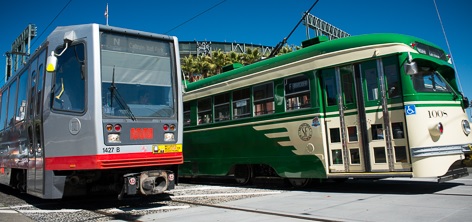By Julia Carrie Wong
JUNE 5, 2014 — “We are sick,” Dave Reardon, a 67-year-old Muni operator told me last night. “We are sick of disenfranchisement, discrimination, deceit, and disrespect.”
Reardon is one of the hundreds of Muni operators who stayed home from work in a wildcat “sickout” action that has crippled the city’s transit system. He’s also retiring on Friday, which makes it easier for him to speak openly about participating in a potentially illegal action.
 The Muni operators’ union, Transport Workers Union Local 250A, is barred from striking, and union president Eric Williams has stated that the union “did not sanction” any kind of work stoppage. He has called on his membership to return to work, but that hasn’t stopped the city from filing an unfair labor practice against the union.
The Muni operators’ union, Transport Workers Union Local 250A, is barred from striking, and union president Eric Williams has stated that the union “did not sanction” any kind of work stoppage. He has called on his membership to return to work, but that hasn’t stopped the city from filing an unfair labor practice against the union.
No letter from the union president can send a message as loud as the one sent by the absent drivers this week, however. Muni operators are pissed, and there’s basically nothing legal that they can do about it.
According to Williams, it’s been four years since transit operators have had a raise. Most public workers endured wage freezes due to the recession, but the MTA is running a surplus now, and it just decided to give up $11 million in annual revenue by ending Sunday parking meter enforcement. So it’s not surprising that the transit operators are hoping to make up ground in this contract, especially given how much the cost of living is rising in the Bay Area.
“We agree that our transit operators should be well paid and paid fairly,” said Paul Rose, spokesperson for the MTA. Of course, management and labor rarely agree on what constitutes fairness.
The deal that emerged from mediation between the union and management includes a 3 percent raise July 1, 2014 and a 2.25-3.25 percent raise July 1, 2015 (the latter is tied to increases in the consumer price index). The deal also increases worker pension contributions by 7.5 percent. Rose says this increase is offset by an additional 5.05 percent wage increase, but Williams says those numbers don’t add up.
“If we accept their proposals,” Williams said, “our members would come up $1.10 an hour short.” That’s unacceptable to Williams, who says, “Our members don’t have a problem paying for our pensions,” but “management lied to workers and said the pension changes would be cost neutral.” According to Williams, the change may be cost-neutral to the city, but it’s not cost-neutral to the workers, who are struggling to remain in what’s become the most expensive city in the country.
Rose denies Williams’ assertion, saying, “This would result in an increase.”
Another major issue for the union is a proposal to institute two-tier wages. According to Williams, all employees hired after a certain date will be paid 5 percent less than the current entry-wage, and will remain 5 percent lower for their entire careers. Williams also raised concerns about safety, equipment, assaults on transit officers, and restroom facilities at terminals.
Reardon spoke with feeling about the restrooms. Operators typically have 6-15 minutes at the end of each route before they must start driving in the opposite direction. This time can be eaten up by any delays, such as those caused by traffic or, perhaps, a tech shuttle idling in a Muni stop. So having a dedicated bathroom can make a huge difference. Muni has a program to install such facilities for the operators, but it’s taking time to roll out. Supervisor Scott Wiener, who was quick to criticize the sickout, has also called into question the need for such facilities.
Rose declined to comment on any of these issues, citing the agency’s commitment “not to negotiate in the press.”
The MTA’s niceties about not negotiating in the press are disingenuous. Negotiations for this contract are over. It’s going to arbitration on Saturday, and the arbitrator must side with management unless the union makes a case that its demands “the public interest in efficient and reliable transit,” thanks to Proposition G. So despite the workers’ overwhelming rejection of the deal on the table, it’s basically impossible to imagine them making any gains in arbitration.
Williams told me that he hopes the MTA will return to negotiations before binding arbitration begins. “We’re just hopeful that they’re willing to sit down,” he said. “You’d hope that in the most liberal city in the world, they would sit down and talk to the workers.”
But Rose says that’s not going to happen: “Per the Charter, yes, negotiations are over.”
Transit strikes always hit the working-class and poor people hard. Sean Elsbernd, who wrote Prop G, probably doesn’t rely on Muni to get to work. That’s not the case for car-less families in the Bayview or Sunset.
For a lot of San Franciscans, the Muni sickout probably feels like a giant “fuck you” from the drivers. But for Muni operators, the passage of Prop G was a giant “fuck you” from the voters.
This is what happens when we strip workers of their right to have a say in their working conditions. It’s enough to make anyone sick.




